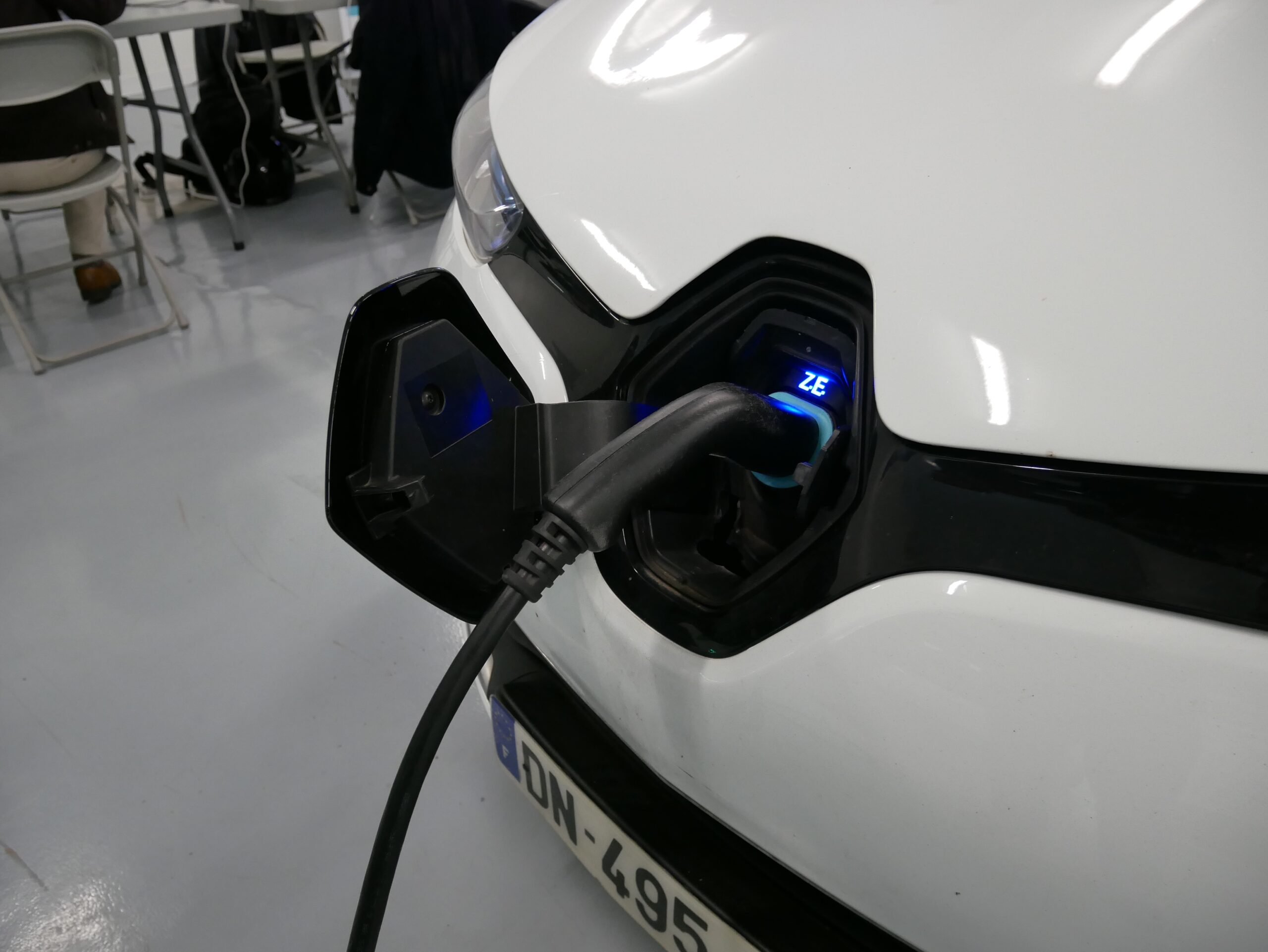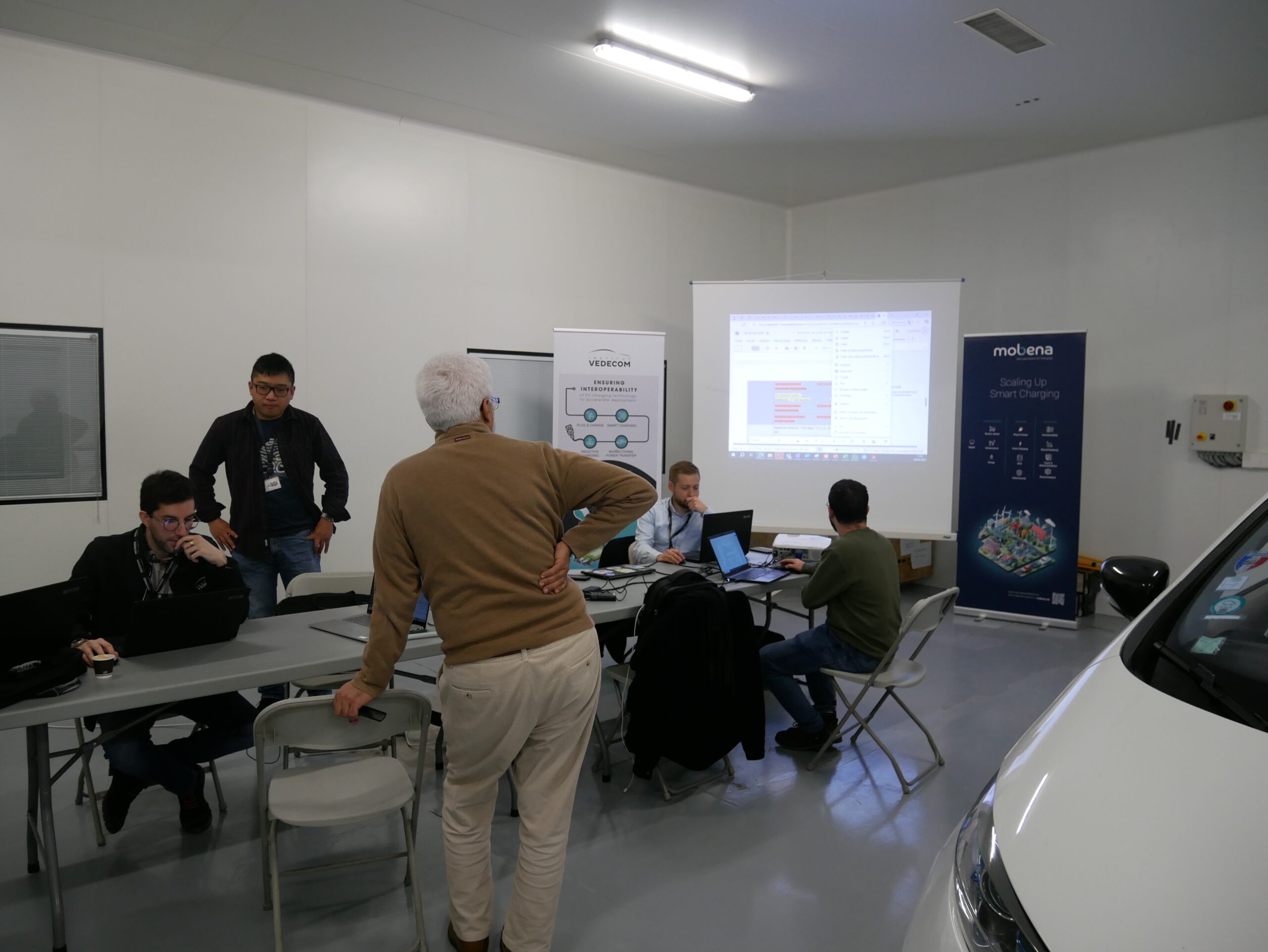
News & Events
Migration from OCPP 1.6 to 2.0.1: Key Takeaways from the Mobena-X PlugFest with WattzHub and Vedecom
Mobena regularly organizes testing sessions to resolve technological barriers related to interoperability or security within the electric vehicle charging ecosystem. These tests foster collaboration between industry stakeholders on multiple levels: between technical experts and between business teams from the consortium’s partner organizations. These events, called PlugFests, are held approximately every three months and enable partner companies to test their solutions in lab environments or (quasi-)real conditions, with material and methodological support from Mobena partners, along with the resources of the Vedecom Institute.
This fourth edition focused on the implementation challenges of version 2.0.1 of the OCPP protocol for a Charge Point Operator (CPO).
Protocols and Tests conducted
The PlugFest brought together R&D engineers from Vedecom, who provided one of their electric vehicles (a Renault Zoé), a charging station, and the team from WattzHub – a CPO who brought a second vehicle and their Charge Station Management System (CSMS).
The objectives of the PlugFest were multifaceted:
– Validate CSMS compatibility with OCPP 2.0.1
– Identify technical challenges for a CPO migrating from version 1.6 to 2.0.1
– Detect potential interpretation differences of the OCPP protocol between CPOs and charging station manufacturers
– Identify gaps in the test cases proposed by the protocol (See Part 6 of OCPP 2.0.1)

Test Environment
WattzHub CSMS for OCPP 2.0.1 compatibility verification
Vedecom AC charger supporting OCPP 2.0.1 and ISO 15118
Two Renault Zoé vehicles: one supporting ISO 15118, the other using basic charging (IEC 61851-1)
Preparation and Execution
The following aspects were tested:
(Cyber)Security:
– Securing the connection between the Vedecom charger and WattzHub CSMS via mutual authentication (Security Profiles 2 and 3 / mTLS)
– Using a unique ID/Password combination for registering a new charger in the CSMS
Provisioning:
– Charger start/restart procedures
– Exchange of configuration parameters necessary for the charging sequence
Authorization:
– via RFID card and via Plug & Charge Contract Certificate
Transaction:
– Start/Stop transaction scenarios using both RFID and Contract Certificate
Tariffs and Meter Values:
– Exchange of meter values: power, voltage, current
– Data exchange required to compute user pricing accurately

Highlights and Key Learnings
The outcomes of this fourth Mobena PlugFest, focused on the migration from OCPP 1.6 to 2.0.1, were overall positive and insightful. Key takeaways include:
OCPP 2.0.1 Compatibility:
– Most tests between WattzHub and Vedecom were successful, requiring only minor adjustments.
Effective Migration Methodology:
– The approach tested during the PlugFest enables a fast and efficient upgrade from OCPP 1.6 to 2.0.1. A clear methodological framework significantly simplifies operations for CPOs.
Test Case Selection Based on OCPP 2.0.1 (Part 6):
– By using Part 6 of the OCPP 2.0.1 specification as a base, the teams quickly selected relevant test cases and efficiently prepared test scenarios and configurations.
Clarification of OCPP Interpretation Between Vedecom and WattzHub:
– Differences in protocol interpretation can lead to varied implementations between CPOs and manufacturers. This PlugFest helped narrow those gaps.
Detailed Review of Test Cases:
Security (mTLS, ID/Password):
– Recommendation to use a unique ID/Password combination to register new chargers in the CSMS
– Recommendation to use mutual authentication (Security Profile 3/mTLS) between charger and CSMS
Provisioning:
– Advisable to end a charging session before rebooting the charger
Remote Control:
– Suggested implementation of message interpretation features
Tariffs & Meter Values:
– CSMS should be capable of leveraging parameters from the charger to reflect actual costs for the end user
Standardized Error Mapping:
– Need to define a standardized error-to-message table (similar to ISO 15118) for quick and clear diagnostics across charger and CSMS interfaces
Path to OCPP 2.0.1 and Beyond:
– While OCPP 2.0.1 enables ISO 15118-2 and -20 compatibility, WattzHub strongly recommends moving to version 2.1 for better support of advanced use cases like bidirectional smart charging (V2X, V2G), with ensured backward compatibility
Additional Insights:
Charging Spot Reservation Test Case:
– Recently added by WattzHub and included in OCPP specifications. It is a crucial component for improving user experience.

Next Steps
Mobena will continue organizing PlugFests to support the sector’s technological maturity and help build a robust EV charging ecosystem. Upcoming events will integrate the latest OCPP protocol evolutions, including Plug & Charge, Smart Charging, and enhanced cybersecurity features.
While OCPP 2.0.1 already significantly improves interoperability and ISO 15118 integration, version 2.1 offers even more potential, especially for bidirectional charging use cases (V2X, V2G).
WattzHub thus strongly encourages stakeholders still using version 1.6 to transition directly to version 2.1, which retains all key benefits of 2.0.1 while ensuring the backward compatibility vital for interoperability.
